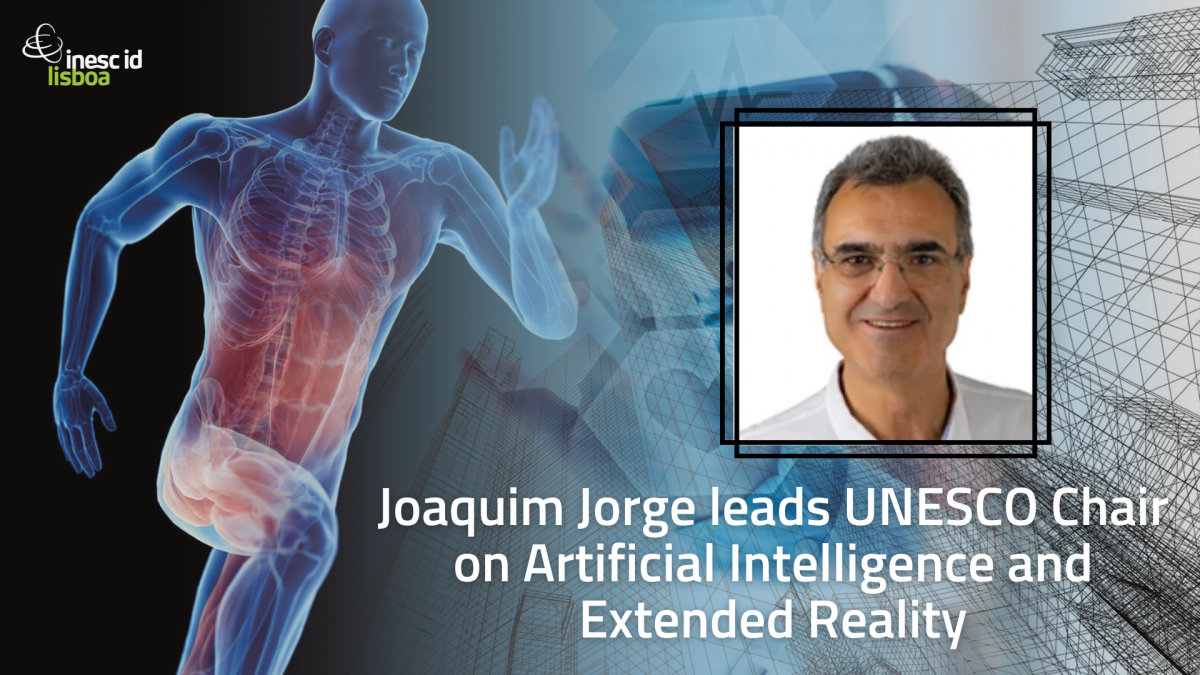
Joaquim Jorge leads new UNESCO Chair on Artificial Intelligence and Extended Reality
Joaquim Jorge – INESC-ID researcher within the Graphics and Interaction Research Area and Full Professor at the Department of Computer Science and Engineering of Instituto Superior Técnico – has been awarded leadership of a new UNESCO Chair on Artificial Intelligence (AI) and Extended Reality (XR), coordinated from INESC-ID and involving thirty institutions across the planet.
The pandemic has brought the need for new methods and processes in work, education, and medical practice – including surgical techniques, as well as outpatient consultation and rehabilitation – into sharp focus. Based on the enhanced capabilities of Artificial Intelligence (AI) and Extended Reality (XR), the creation and nurturing of networks of geographically distant yet continuously linked hospitals – where experts will be able to consult, teach, monitor, and train colleagues remotely via XR – could foster a medical community more resilient to pandemics.
Adding to the day-to-day dimension of medical practice, engineers, doctors and policy-makers increasingly rely on AI to make diagnostic and policy decisions on societal matters and public policy affairs. Here, Explainable AI (XAI) – a set of tools that help users understand the predictions and recommendations made by an AI – has the clear potential to improve human understanding of automatically generated diagnostics and policy recommendations, a technological leap that is becoming ever more vital in finding solutions to pressing societal problems.
In order to synergistically tackle these issues, Professor Joaquim Jorge has been awarded a UNESCO Chair on Artificial Intelligence and Extended Reality to lead a world-wide consortium of thirty institutional partners (from Carnegie-Mellon and Columbia in the US to the universities of Auckland and Otago in New Zealand), steered from INESC-ID. By featuring a world-class diverse and balanced team of scientists, academics, clinicians and policymakers, the UNESCO Chair on AI and XR will implement an ambitious research and collaborative strategy by:
- Offering advanced degree “shared diplomas”, either face-to-face or through eLearning;
- Engaging in multidisciplinary research on AI/XR for medical applications, among others;
- Organizing or supporting international conferences, publications and seminars around the unifying themes of the UNESCO Chair;
- Promoting joint supervision of MSc and Ph.D. theses, as well as the mobility of students and research professors, thus stimulating north-south exchanges of expertise.
The UNESCO Chair on AI and XR is aligned with UNESCO’s fields of competence in the exchange of experience and knowledge between universities and other higher education institutions, extending the benefits of research and development and the rapid transfer of knowledge to communities through international inter-university cooperation and twinning, networking and other linking arrangements. An integrated system of research, training, information and documentation on AI and XR is the ultimate goal of this UNESCO Chair.
Awarding of the UNESCO Chair on Artificial Intelligence and Extended Reality follows earlier recognition of Professor Jorge’s distinguished work in the field of computer science and engineering, such as his recent election to the 2023-2025 Board of Governors of the IEEE Computer Society (IEEE CS, the largest global community of computer scientists and engineers), a leadership position and honour conferred to the most accomplished figures in tech and academia.
